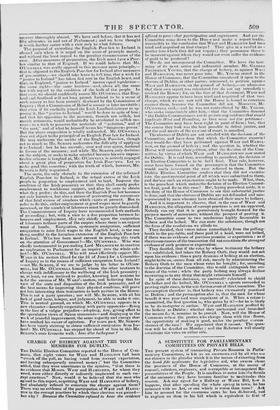CHARGE OF BRIBERY AGAINST THE TORY MEMBERS FOR DUBLIN.
THE Dublin Election Committee reported to the House of Com- mons, that eight voters for WEST and II Amti.vom had been "struck off the poll, as having voted from corrupt expectation, and having subsequently received money ;" but the Committee added, that they were unanimous in the opinion, "that time is no evidence that Messrs. Weer and HAMILTON, for whom they voted, were either directly or indirectly implicated in such col- supt practices." Now, would it be believed that the men who agreed to this report, acquitting Wine and HAMILTON of bribery, bad absolutely refused to entertain the charge against them? There was no evidence of the participation of WEST and HAMIL- TON in the corrupt practices by which their election was gained— but why ? Because the Committee refusal to hear the evidence offered to prove that participation and cognizance. And yet ►los Committee come down to the House and make a report !radii). irresistibly to the conclusion that WEST and HAMILTON had been tried and acquitted on that charge! They give in a verdict on s matter into which they did not inquire; they pronounce those to be innocent against whom they would not even suffer the evidence of guilt to be produced I
We do not misrepresent the Committee. We have the testi
molly of its mist active and influential member. Mr. GEORGE FREDERICK YOUNG, that the charge of bribery, RS against W asT and IlAmi LToN, was never gone into. Mr. Yousea stated in the House of Commons, that the Committee considered it open to the electors of Dublin, or other parties interested, to petition against WEST and HAMILTON, on the grimed of bribery,—an admission that their own report was calculated (we do not say intended) to mislead the House; for, on the face of that document, WEST and HamiLeoe appear to have been tried and acquitted of that veil
charge, which we are now told the House is bound to entertain aeainst them, because the Committee did not. Moreover, Mr.
O'CONNELL said,—and lie was not contradicted by Mr. YOUNG. who spoke immediately after Wm.—that the Committee directed " the Dublin Commiesioners rot to go into any evidence that would implicate West and Hamilton, as they were not the petitioner.. The Committee may have been right in point of form ; but, that the course they took was the best possible to defeat justice, and put the real merits of the case out of court, is manifest.
The electors of Dublin are not satisfied with the decision of the Committee, and have done that which the Committee expecte I they would do—they have petitioned against WEST and HAMIL- TON, on the ground of bribery ; and the question is, whether the House will sanction their petition, after the decision of the Com- mittee, by virtue of which WEST and HAMILTON are now seated for Dublin. It is said that, according to precedent, the decision of an Election Committee is to be hell final. That rule, however, must have been formed on the presumption that the Committee would really investigate the case referred to them. But the Dublin Election Committee confess that they did not examine into the most material point of all which were submitted to them, and declare such an examination ought to be made. What, then, is the precedent which makes the decision of an Election Commit- tee final, good for in this ease? But, laying precedent aside, it is the duty of the House of Commons to see that substantial justice is done, and that the electors of Dublin are not defrauded and mis- represented by men who may have obtained their seats by bribery.
And it is important to observe, that in the case of WEST and HAMILTON, the allegation of corrupt practices is not unsupported, Nobody can say that it is gratuitously brought forward for the purpose merely of annoyance, without the prospect of proving it. The Committee came to two resolutions highly favourable to bribers and the bribed. We can state the substance, though not the form of the resolutions we allude to.
They decided, that voters taken immediately from the polling- booth to the pay-table, and there paid 31. a head, were not bribed, if there was no evidence of previous promise or expectation : as if thecircumstances of the transaction did not constitute the strongest evidence of such promise or expectation. They decided, that if the voter by whose testimony the bribery was established, had taken the Bribery Oath, they would not act upon his evidence: thus a party desirous of bribing at an election, might bribe on, secure from all risk, merely by administering the Bribery Oath to the men whose votes he bought ; for, according !odic doctrine of the Committee, this would extinguish the evi- dence of the voter ; while the party bribing may always decline answering as to any thing that might criminate himself. In spite of these decisions, so eminentle calculated to shield the briber and the bribed, Mr. O'CoeeRsiss agents succeeded in proving eight cases, to the satisfaction even of this Committee. The presumption therefore is, that bribery was evensively practised in Dublin ; and the presumption also is, that the men for whose benefit it was practised were cognizant of it. When a crime is committed, the first question is, who gains by it?—for he is likely to be its instigator or author. WEST and HAMILTON profited by the bribery at Dublin : whether they authorized and furnished the means fur it, remains to be proved. Now, will the House of Commons refuse the parties who charge them with this o.ffence, the opportunity of making it good, under the peculiar corcum stances of the ease? We apprehend that it newt. The ques- tion will be decided on Monday ; and the Reformers will closely scrutinize the votes on either side.


























 Previous page
Previous page